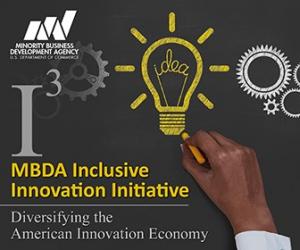
The Inclusive Innovation Initiative (I-3) is a national outreach effort to increase the participation of minority business enterprises (MBEs) and minority-serving institutions in the national federal laboratory network.
To develop a practical, effective approach to inclusive innovation, I-3 will strategically engage MBEs and young entrepreneurs in the transfer and commercialization of federal research and Science, Technology, Engineering and Mathematics (STEM) expertise. The goal is to build a pipeline for minority innovators to gain access to America’s pioneering innovation ecosystems.
As the leading federal technology transfer clearinghouse for communities of color, the Minority Business Development Agency (MBDA) will focus on expanding opportunities for MBEs engaged in developing innovative business solutions in today’s top emerging industries and the innovations of the future.
MBDA I-3: Education, Collaboration and Partnerships
Federal technology transfer, the process of commercializing STEM-based products and services born in government labs, is a key innovation tool for minority-owned businesses seeking access to top-notch research and cutting-edge technology discoveries. To support the next generation of innovators, MBDA will build and maintain an innovation ecosystem that is inclusive and leading-edge, which is a top priority of the U.S. Department of Commerce.
MBDA recognizes that the national federal laboratory network is uniquely positioned to serve as a vehicle to accelerate the number of MBEs in high growth industries. In partnership with the Federal Laboratory Consortium (FLC), MBDA will host a series of signature events and educational programming alongside federal technology transfer experts, to help MBEs, Historically Black Colleges and Universities (HBCUs) and Minority-Serving Institutions (MSIs) prepare for the next era of American innovation and scientific advancement.
This collaborative approach will connect MBEs to the vast network of science, manufacturing, and research assets located in over 300+ federal laboratories across the country. Most importantly, this inclusive approach will create a series of regional ecosystems that embrace the economic impact and entrepreneurship spirits of the growing minority business community.
This will also support a new generation of skillful minority entrepreneurs by transferring technologies that have the capacity to bring new innovative products and services to the U.S. marketplace. As lead advocate for the expansion of this ecosystem, the I-3 Program will deliver on the Obama Administration’s goal of providing for more inclusive entrepreneurship. MBDA and consortium partners will partner with assistance providers to ensure that more discoveries are transferred out of the laboratories by engaging underrepresented populations. This activity increases the return on investment of the American people, thus ensuring every entrepreneur has access to the resources they need to innovate and spur job creation in communities of color.
Measurability of I-3 Program
In line with the President’s Memorandums on Accelerating Technology and Commercialization of Federal Research in Support of High-Growth Businesses, the success of our I-3 Program will be measured on its ability to do the following:
- Increases the utilization of the 300 Federally-funded research facilities by entrepreneurs and innovators;
- Ensures that relevant Federal institutions and employees are appropriately incentivized to prioritize R&D commercialization;
- Optimizes the management, discoverability, and ease-of-license of the 100,000+ Federally-funded patents;
- Educates underserved populations on the technology transfer marketplace, including the expansion of opportunities for greater entrepreneurship education; and
- Maximizes the economic utilization of the Small Business Innovation Research (SBIR) and Small Business Technology Transfer (STTR) programs among MBE’s and MSI’s.
- Supports fundamental research that expands the frontiers of human knowledge, and yields extraordinary long-term economic impact through the creation of new knowledge and ultimately new industries.
Background
Every year, billions of American taxpayer dollars go into funding research and development (R&D) at our federal laboratories, with the intent being for those innovations to return their investment and move from the laboratory to the marketplace, thereby boosting our economy.
To ensure the best use of taxpayers' contributions to R&D conducted at federal labs, Congress enacted the Stevenson-Wydler Technology Innovation Act of 1980 and the Federal Technology Transfer Act of 1986, which mandated that federal labs accelerate the results of their hard work into the market through collaborative partnerships with any nonfederal organization such as private business, academia, and state and local governments.
Related Posts
- MBDA Showcases the Importance of Inclusive Innovation at the 2016 Federal Laboratory Consortium (FLC) Conference
- The Path to Sustainability for Historically Black Colleges and Universities
- Minority Business Development Agency Invests $1.425 Million in Nine MBDA Business Centers to Expand Reach
- NIST Hosts "Innovations in STEM: National Priorities and NIST" Symposium with HBCUs and HSIs
- Fueling High Tech Growth through Minority Business
Videos
text


